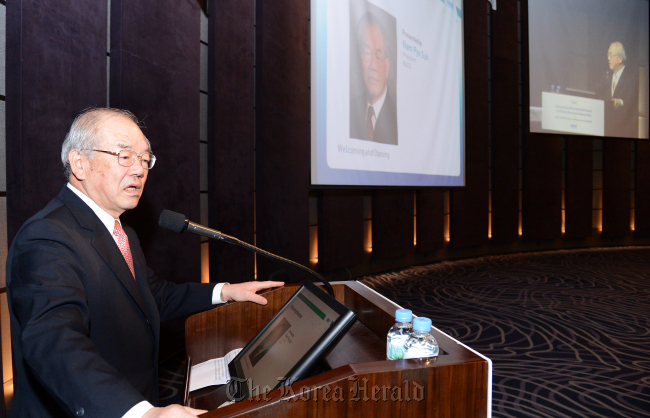Research universities agree to improve ‘learning infrastructure’
By Korea HeraldPublished : Oct. 16, 2012 - 19:44
Leaders of top research-oriented universities in 27 countries agreed to work together to build a creative and innovative learning infrastructure during an annual forum in Seoul on Tuesday.
More than 80 participants representing 56 universities attended the International Presidential Forum on Global Research Universities hosted by the Korea Advanced Institute of Science and Technology.
Under the theme “Effective Education and Innovative Learning,” the participants discussed the significance of creative and collaborative learning, the importance of student-focused curriculum and how to utilize technological advancements for effective learning.
More than 80 participants representing 56 universities attended the International Presidential Forum on Global Research Universities hosted by the Korea Advanced Institute of Science and Technology.
Under the theme “Effective Education and Innovative Learning,” the participants discussed the significance of creative and collaborative learning, the importance of student-focused curriculum and how to utilize technological advancements for effective learning.

“This forum has become an important event of global universities, where new ideas have evolved through the deliberations that have taken place here,” Suh Nam-pyo, KAIST president, said in his welcoming address.
This year’s theme, Suh added, is crucial as the global education sector will undergo significant changes over the next decade.
“These changes are driven by the need to improve the efficacy of education and the learning process, and contain the accelerating cost of education,” he added.
A series of presentations and discussions dealt with how to accelerate technological innovation to boost efficiency and quality of learning.
Gene Block, chancellor of the University of California, Los Angeles noted that research universities need greater collaboration in education and research across international borders as global challenges require innovative global solutions.
“The widespread availability of high-speed Internet connectivity, increasingly powerful and inexpensive wireless devices and media-rich social networking opportunities have created a fundamental change in the way we communicate and learn,” said Wayne C. Johnson, assistance vice president of California Institute of Technology.
He insisted that educators need to “reform” curricula to better match both industry needs and student desires.
KAIST has hosted the annual forum on global research universities since 2008.
By Oh Kyu-wook (596story@heraldcorp.com)
-
Articles by Korea Herald











![[Hello India] Hyundai Motor vows to boost 'clean mobility' in India](http://res.heraldm.com/phpwas/restmb_idxmake.php?idx=644&simg=/content/image/2024/04/25/20240425050672_0.jpg&u=)








